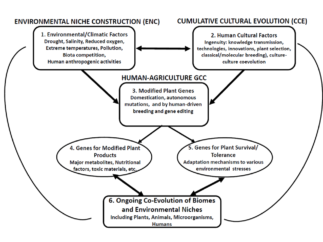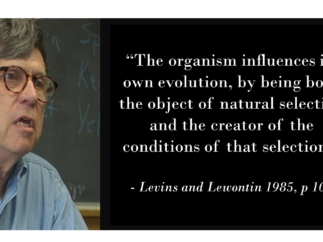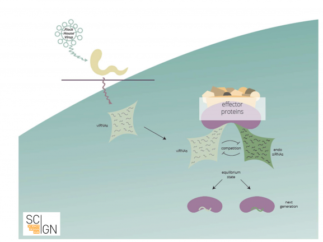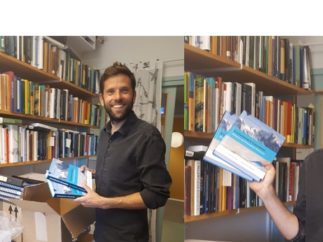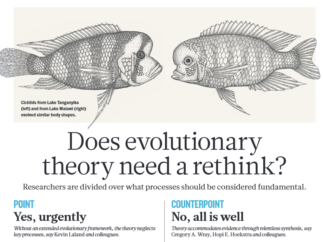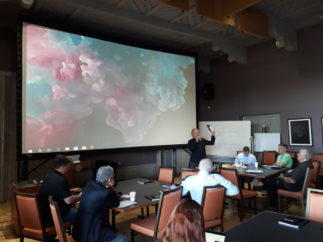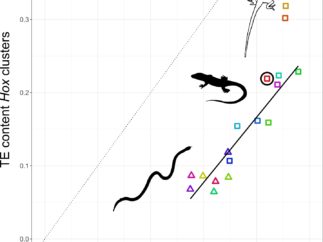In our recent paper, “Understanding agriculture within the frameworks of cumulative cultural evolution, gene-culture coevolution and cultural niche construction” (Human Ecology 47:483–497), we apply the framework and concepts of Gene-Culture Coevolution (GCC), Niche Construction (NC) and Cumulative Cultural Evolution (CCE) to agriculture. All three concepts were originally conceived with respect to human culture and human genes, and later on also with animal genes (mainly domesticated animals). However, to the best of our knowledge, ours is the first full discussion of how plant genes coevolve with human cultural practice.
Organism-Constructed Environments are Different
I am very happy that the article Niche construction affects the variability and strength of natural selection, which I co-authored with Andrew Clark, Dominik Deffner, John Odling-Smee, & John Endler, has just been published in The American Naturalist. I’ve argued for a long time that niche construction – the modification of environments by organisms – is an evolutionary process, but the idea remains contentious. I’d like to think that this paper is potentially significant, because it helps to make the case that the environmental conditions manufactured and modified by organisms differ in important respects from non-constructed environments, which results in different responses to selection.
Does Inheritance Need a Rethink? Conceptual Tools to Extend Inheritance beyond the DNA
Inheritance is an essential component of evolutionary processes. Without inheritance, evolution by natural selection cannot lead to the accumulation of complex, adaptive traits. But what can be inherited, and how?
The Evolution of Robustness
In Darwin’s theory of evolution by natural selection, the key phrase is “survival of the fittest”: those organisms that are best fit to carry out the tasks of living in their world are the ones that survive. But they won’t live forever — they must have offspring that inherit the traits that made them fit in order for evolution to proceed.
This conceptual framework is fine for understanding the evolution of traits that affect survival and numbers of offspring. But what about the rules of inheritance themselves? These rules are also organismal traits, although they need not have any effect on how well the parents survive or how many offspring they have. In fact, the rules of inheritance say what the offspring are, rather than how many there are. Classical mathematical models of evolution have little to say about the evolution of these rules. How, then, can “survival of the fittest” shape the rules of inheritance?
Evolutionary Causation: Biological and Philosophical Reflections
“Evolutionary Causation: Biological and Philosophical Reflections“, edited by Tobias Uller and Kevin Laland, has just been released through the MIT Press. One of the major publications from the EES project, it is a tightly-integrated array of essays from biologists and philosophers on the causal structure of evolution. You can read the preview on Google Books and order the book through major outlets such as Amazon, Powell’s, etc.
In the next few blog posts, we will explore some of the major themes presented in the book, such as developmental bias & plasticity, niche construction, major transitions in individuality, etc. Today, we interviewed Tobias Uller, lead co-editor, about the book and its backstory. We also asked him to suggest various ways to approach the book.
Early Career Spotlight with Illiam Jackson
Illiam Jackson just wrapped up his work at Tobias Uller’s lab (Lund) and is moving on to great things. We talked to Illiam about himself, his work, and papers he liked under the EES project.
Check out his new paper:

Early Career Spotlight with Thomas Oudman

The “Does Evolutionary Theory Need a Rethink?” Debate: A Backstory
In October 2014, Nature magazine published “Does evolutionary theory need a rethink?”, an exchange in back-to-back articles between advocates of an ‘extended evolutionary synthesis’ and more traditionally minded researchers. The exchange provoked considerable discussion across many academic fields, which continues to this day. Recently, on Twitter, a question was raised concerning the origin of this piece. Who initiated this "debate?" Was there an actual dialogue between the sides prior to publication?
StuFest- Celebrating Stuart Kauffman’s 80th Birthday
This year we celebrate Stuart Kauffman's 80th birthday. Kauffman was one of the early proponents of the view that the complexity we see in biological systems is not necessarily a consequence of natural selection alone, but could result just as well from spontaneous self-organization.
The Role of Mobile Genetic Elements in Evolution and Development
A new study in Evolution Letters suggests that transposable elements are important for both developmental processes and evolutionary diversification in snakes and lizards. Author Dr Nathalie Feiner explains her findings in our latest blog.
